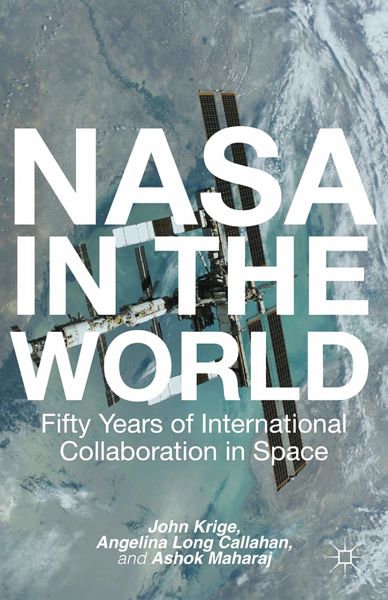
NASA in the World (eBook, PDF)
Fifty Years of International Collaboration in Space

PAYBACK Punkte
36 °P sammeln!






Since its inception, NASA has participated in over 4,000 international projects, yet historians have almost entirely neglected this remarkable aspect of the agency's work. This groundbreaking work is the first to trace NASA's history in a truly international context, drawing on unprecedented access to agency archives and personnel.
Dieser Download kann aus rechtlichen Gründen nur mit Rechnungsadresse in A, B, BG, CY, CZ, D, DK, EW, E, FIN, F, GR, HR, H, IRL, I, LT, L, LR, M, NL, PL, P, R, S, SLO, SK ausgeliefert werden.
John Krige is Kranzberg Professor in the School of History, Technology and Society at the Georgia Institute of Technology, USA, and the author of American Hegemony and the Postwar Reconstruction of Science in Europe (2006). An acknowledged expert on the history of the space program, he has appeared in recent years on American Public Radio, the BBC, and Swiss Radio. Angelina Long Callahan is Associate Historian at the Naval Research Laboratory in Washington, DC, USA, where she wrote her dissertation on meteorological satellites and the Cold War. She has a PhD from the Georgia Institute of Technology's School of History, Technology, and Society. Her other research pursuits include the history of 1920-30s drone research and development and technological roots of the Vanguard satellite project. Ashok Maharaj has a PhD from the Georgia Institute of Technology's School of History, Technology, and Society, USA. He lives and works in Chennai, India.
Produktdetails
- Verlag: Palgrave Macmillan US
- Seitenzahl: 353
- Erscheinungstermin: 20. August 2013
- Englisch
- ISBN-13: 9781137340931
- Artikelnr.: 40719918
"It tells the story of NASA's collaboration with the European, Japanese, Indian and Soviet space programs in a series of case studies that vary in length and detail. The book analyzes the earthly side of the space agency, with much attention for the practical, every-day side of international cooperation. ... NASA in the World provides important empirical studies of the political and practical sides of international science and technology." (David Baneke, Minerva, Vol. 53, 2015)
"NASA in the World is ... extremely detailed, but it is a study of importance to the history of spaceflight and American diplomacy, European, Russian, Japanese, and Indian area studies, and transnational science and technology since 1958. ... I recommend
"NASA in the World is ... extremely detailed, but it is a study of importance to the history of spaceflight and American diplomacy, European, Russian, Japanese, and Indian area studies, and transnational science and technology since 1958. ... I recommend
Mehr anzeigen
it." (Michael J. Neufeld, Technology and Culture, Vol. 55, July, 2014)
'Assertions of national pride and global leadership have thoroughly suffused, and often distorted, most US media and historical treatments of the space program. This volume is a long overdue corrective, written by a team led by the preeminent historian of European space exploration. Krige, Callahan, and Maharaj give us as thoroughly researched, complete, and readable an account as one could ask for.' - Sylvia Kraemer, former NASA Chief Historian
'Krige, Callahan, and Maharaj demonstrate that, since the start of the Space Age, NASA engineers and administrators sought to balance national leadership in space with their collaboration and cooperation with foreign partners. NASA in the World is a significant step in helping us see space exploration as both an expression of national foreign policy and a global endeavor.' - W. Patrick McCray, Professor of History, University of California, Santa Barbara, USA
'Far more attention has been paid to competition than cooperation in the history of spaceflight. In this excellent and engaging book, however, the authors make it very clear why studies of cooperation really do matter.' - Robert W. Smith, Professor of the History of Science, University of Alberta, Canada
'By documenting NASA's international relations over its first 50 years, John Krige and his co-authors not only fill a huge gap in NASA history, they bring it to a new level of sophistication and current relevance. Moving beyond nuts and bolts history, the authors admirably succeed in their goal of firmly placing NASA on the world stage, reflecting both the ideals and contradictions of American foreign policy.' - Steven Dick, former NASA Chief Historian
'Assertions of national pride and global leadership have thoroughly suffused, and often distorted, most US media and historical treatments of the space program. This volume is a long overdue corrective, written by a team led by the preeminent historian of European space exploration. Krige, Callahan, and Maharaj give us as thoroughly researched, complete, and readable an account as one could ask for.' - Sylvia Kraemer, former NASA Chief Historian
'Krige, Callahan, and Maharaj demonstrate that, since the start of the Space Age, NASA engineers and administrators sought to balance national leadership in space with their collaboration and cooperation with foreign partners. NASA in the World is a significant step in helping us see space exploration as both an expression of national foreign policy and a global endeavor.' - W. Patrick McCray, Professor of History, University of California, Santa Barbara, USA
'Far more attention has been paid to competition than cooperation in the history of spaceflight. In this excellent and engaging book, however, the authors make it very clear why studies of cooperation really do matter.' - Robert W. Smith, Professor of the History of Science, University of Alberta, Canada
'By documenting NASA's international relations over its first 50 years, John Krige and his co-authors not only fill a huge gap in NASA history, they bring it to a new level of sophistication and current relevance. Moving beyond nuts and bolts history, the authors admirably succeed in their goal of firmly placing NASA on the world stage, reflecting both the ideals and contradictions of American foreign policy.' - Steven Dick, former NASA Chief Historian
Schließen
Für dieses Produkt wurde noch keine Bewertung abgegeben. Wir würden uns sehr freuen, wenn du die erste Bewertung schreibst!
Eine Bewertung schreiben
Eine Bewertung schreiben
Andere Kunden interessierten sich für











